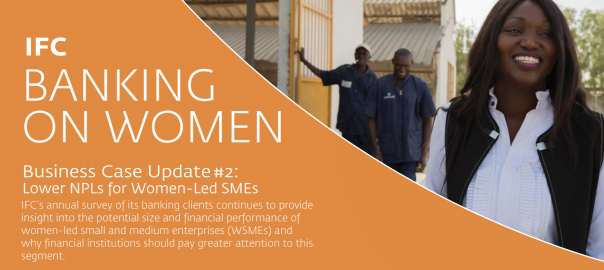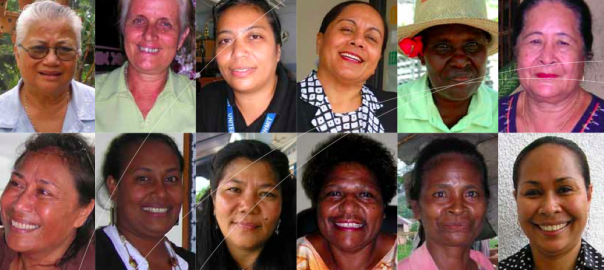
Tag Archives: IFC


Non-financial Services: The Key to Unlocking the Growth Potential of Women-led Small and Medium Enterprises for Banks
Non-financial Services: The Key to Unlocking the Growth Potential of Women-led Small and Medium Enterprises for Banks
This study examines the benefits to banks of integrating non-financial services (NFS) that can help mitigate these barriers into a women-focused SME banking proposition. Analysis of five SME banking models, in addition to previously published case studies and other resources, found that well-integrated NFS offers for WSMEs yield positive return on investment (ROI) within one to two years. This is demonstrated through four key metrics: increased interest income; share of wallet, which includes cross-sell, deposit volume and fee income, including fees charged for NFS participation; loyalty; and reduced risk.While increased interest income is often the largest contributor to ROI, particularly in the first one to two years, each of the four components mentioned above has been individually found to cover NFS costs. This signals an opportunity for banks to ensure their full product suite, along with communication and delivery, is tailored to WSMEs, as this can pave the way for the segment to take full advantage of the bank’s offers.

IFC Banking on Women Business Case Update
IFC Banking on Women Business Case Update
IFC’s annual survey of its banking clients continues to provide insight into the potential size and financial performance of women-led small and medium enterprises, and why financial institutions should pay greater attention to this segment.

Islamic Finance with a Gender Lens
Islamic Finance with a Gender Lens
Bilal Al Sugheyer of IFC summarized the primary elements of Islamic finance and Islamic banking during a panel at the 2018 Summit.

Ecosystem Plays to Solve for Lifecycle Needs – IFC
Ecosystem Plays to Solve for Lifecycle Needs – IFC
In this 2018 Summit panel, Sharmila Hardi discussed three of IFC’s ecosystem plays focused on childcare, housing and non-financial services that are helping solve for women’s lifecycle needs.

Evaluation Report: Bank of Palestine Strengthens Women-Owned Businesses and the Economy
Evaluation Report: Bank of Palestine Strengthens Women-Owned Businesses and the Economy
This evaluation report highlights the business results and lessons learned from IFC’s partnership with Bank of Palestine and its Felestineya Women’s Market program.

Gender Intelligence for Banks
Gender Intelligence for Banks
This IFC study of the workforce at GBA member HBL in Pakistan examines the differences between employees who underwent gender awareness training and those who did not, finding striking results about the benefits of such training.

Research Matrix: BLC Bank Sample Criteria
Research Matrix: BLC Bank Sample Criteria
BLC Bank conducted qualitative market research through two rounds of focus groups in collaboration with the IFC and a local market research company. The research matrix and questionnaire were designed by the IFC, based on BLC Bank recommendations. The market research company was responsible for identifying and recruiting respondents using the pre-defined matrix, ensuring their presence at the meeting and transcribing the findings.

Creating an Insurance Value Proposition – IFC
Creating an Insurance Value Proposition – IFC
Susan Holliday highlighted the growing value of women to the insurance market in this 2016 GBA Summit presentation.

Key Levers to Enable Women-Owned SMEs
Key Levers to Enable Women-Owned SMEs
The World Bank Group’s director of the Global Indicators Group Augusto Lopez-Claros shared these slides on secured transactions systems at the 2016 GBA Summit.

Women, Business and the Law 2016
Women, Business and the Law 2016
This World Bank report measures and compares gender parity in 173 economies, using data about legal restrictions on women’s entrepreneurship and employment in order to inform policy discussions and promote research on the linkages between the law and women’s economic opportunities.

2015 Summit: She for Shield
She for Shield
This is the presentation given by Heather Kipnis, Entrepreneurship Lead, Gender Secretariat, International Finance Corporation, World Bank Group, during the panel The Women’s Market for Insurance at the 2015 GBA Summit.

2015 Summit: Demand Data Sets – Bénédicte de la Brière
Demand Data Sets: The Other Side of the Equation
This is the presentation given by Bénédicte de la Brière, Lead Economist, Gender, Human Development Network, World Bank Group, during the panel on Demand Data Sets at the 2015 Global Data Symposium.

Women in Business
Women in Business
This is a presentation made by Alliance CEO Inez Murray at the IFC/Financial Times “Sustainability Days” conference in February 2013. It is a good source of statistics and information on the business case for serving the Women’s Market, an overview of the steps to take in building a Women’s Market program, and a presentation of the cases of Fleet Bank Boston and Westpac Australia. It also offers an extensive discussion of customer segmentation.

Garanti Bank SA: Combining SME Banking Excellence with a Proposition for Women Entrepreneurs in Turkey
Garanti Bank SA: Combining SME Banking Excellence with a Proposition for Women Entrepreneurs in Turkey
This case study from the World Bank and IFC explores how Garanti leaders decided to focus on women entrepreneurs, documents and analyzes the bank’s efforts to build a profitable and sustainable “women in business” franchise, and provides insights into how Garanti tapped into its market leading SME Banking franchise to more effectively target women in business.

Women-Owned SMEs: A Business Opportunity for Financial Institutions
Women-Owned SMEs: A Business Opportunity for Financial Institutions
This report seeks to estimate the global and regional size of the women-owned SME market for financial services operating in the formal sector. It looks at the financing gap they face, as well as common financial and non-financial barriers faced by women entrepreneurs. The report also provides an estimate of the IFC’s global reach to formal women-owned SMEs.

Strengthening Access to Finance for Women-Owned SMEs in Developing Countries
Strengthening Access to
Finance for Women-Owned SMEs in Developing
Countries
As access to finance is repeatedly identified as a major constraint to women entrepreneurs, this GPFI and IFC report sets out to analyze the issues involved in improving access to finance for women-owned businesses. It also aims to identify scalable financing models that can be replicated in G20 and interested non-G20 countries looking to increase the opportunities of women-owned businesses as those nations further develop their private sector.

Women in Business: Drivers of Development
Women in Business: Drivers of Development
This wide-ranging IFC report examines women’s economic activity and workforce participation in multiple geographics and via multiple dimensions: Women as Leaders, Women as Entrepreneurs, Women as Consumers, Women as Employees, Women as Stakeholders.

Women, Business and the Law: Removing Barriers to Economic Inclusion
Women, Business and the Law: Removing Barriers to Economic Inclusion
This World Bank report measures and compares gender parity in 141 economies via legal differentiations on the basis of gender, covering six areas: accessing institutions, using property, getting a job, providing incentives to work, building credit and going to court.

Embedding Gender in Sustainability Reporting
Embedding Gender in
Sustainability Reporting
This IFC report highlights some of the existing and emerging business drivers for improving practices and reporting on material gender issues.

Gender Dimensions of Investment Climate Reform
Gender Dimensions of
Investment Climate
Reform
This IFC guide offers solutions and encourages change by providing policymakers and practitioners with tools needed to focus on the potential of women entrepreneurs. It also provides thought leadership on common policy and regulatory issues that women entrepreneurs face and analyzes key investment climate areas for growth with a gender lens.

Economic Opportunities for Women in the Pacific
Economic Opportunities for Women in the Pacific
This comprehensive IFC and AusAID report showcases successful female entrepreneurs from seven Pacific Island countries and discusses their common challenges, which include remoteness and isolation that results in high transport costs, a small domestic market, and political and civil instability.

Banking on Women in Business: Exim Bank
Banking on Women in
Business: Exim Bank
This IFC Case Study on Exim Bank provides a brief overview of the increasingly competitive financial services sector in Tanzania, the opportunity that women-owned small & medium enterprises represent, and possible tactics for tapping the woman-owned SME market.

Banking on Women in Business: Access Bank
Banking on Women
in Business: Access Bank
This IFC Case Study offers a brief description of the business landscape for women in Nigeria, as illustrated by the story of Muni Shonibare, a Nigerian woman entrepreneur with a furniture-making business, whose clients included Mobil and Hilton Hotels. Access Bank provided her with $800K in expansion capital.

